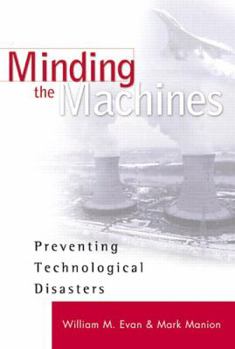Minding the Machines: Preventing Technological Disasters
Select Format
Select Condition 
Book Overview
A provocative and authoritative guide to understanding the questions surrounding technology disasters that occur, with a blueprint for the prevention of future disasters, this book looks at over three... This description may be from another edition of this product.
Format:Hardcover
Language:English
ISBN:0130656461
ISBN13:9780130656469
Release Date:January 2002
Publisher:Prentice Hall PTR
Length:485 Pages
Weight:1.40 lbs.
Dimensions:1.2" x 6.3" x 9.2"
Customer Reviews
4 ratings
awesome
Published by Thriftbooks.com User , 20 years ago
Iliked this book. It covered alot of topics, all concerning ethics. Good job Mark
Minding Our Machines
Published by Thriftbooks.com User , 21 years ago
Minding the Machines reminds us of one crucial fact: technological disasters are almost always the result of human error. But the flip side of this truism offers hope: humans learn from their mistakes, and technological disasters can be prevented. Evan and Manion, both professors in Pennsylvania, study a number of key technological disasters spanning the twentieth century-from the sinking of the Titanic to the poison gas release at Bhopal. The result is Minding the Machines: a systematic analysis of technological risk.In each case study of technological disaster, the authors go straight to the heart of the problem: human error. Evan and Manion rightly recognize that "technological disasters are failures of sociotechnical systems." In other words, technologies are human creations, and therefore the root causes of technological disasters should be sought in the human systems that gave rise to the technologies in the first place. Once the causes are isolated, future solutions can be developed. But only at the social, economic, and political levels can acceptable solutions to technological risk be generated. To prevent future disasters, we must mind the machines; the machines will not mind themselves.The pace of the book is slowed somewhat by the exhaustive analysis to which academics are prone. Yet the diligent reader is rewarded. The case studies of the Titanic, Challenger, and Three Mile Island disasters make for fascinating, if sometimes morbid, reading. The meat of the book can be found in chapters five ("The Root Causes of Technological Disasters"), eleven ("The Role of Corporations in the Management of Technological Disasters"), thirteen ("Assessing the Risks of Technology"), and fourteen ("Technological Decisions and the Democratic Process"). With these four chapters alone, Minding the Machines may prove invaluable for those in industry and government who want to better understand how a little prevention can be worth billions in cure-not to mention saved lives.[This review is modified from my original review of Minding the Machines, Colorado Springs Business Journal, 12 July 2002]
Great insight and guidance
Published by Thriftbooks.com User , 22 years ago
The enormous technological advances of our time bring with them great vulnerabilities. Things break down, people screw up. This has always been so, but now the very power and scope and pervasiveness of our devices and systems give leverage to the breakdowns and screwups. Cost-saving refusal to install an $11 part in the Ford Pinto cost 500-900 lives, untold injuries, and $137 million in damages. Miscommunication among pilots and traffic controllers, and mismanagement of stressful demands on pilots, resulted in 587 dead, 57 injured, and $110 million in property and damage costs in the Tenerife runway collision. Chernobyl, Bhopal, asbestos poisoning, the list goes on.Unlike natural disasters, technological disasters are predictable and preventable - but only if we recognize the new vulnerabilities and risks inherent in technological advances and effectively neutralize them. For that, it is essential that we learn from those man-made disasters that have already occurred. Evan and Manion have analyzed a wide range of technological disasters to their root causes, and describe how they can be prevented by appropriate training and action by scientists and engineers, by corporate executives and managers, by administrators of government agencies, by legislators, by academics like themselves, and by the general public. Here we have the example of the Year 2000 problem. Many believe this was overblown because it came to nothing. But it had so little effect because corporations and governments world wide spent more than $600 billion to avert it, aided by teams of engineers and scientists, largely from the US.We also have the example of September 11. With the likelihood of terrorists exploiting the vulnerabilities in the technologies on which we increasingly depend, it is vital that we understand and act upon the very important work that Evan and Manion have done for us here. Executives and shareholders will be especially interested in how a corporation can avoid causing a technological disaster, with its potentially crippling costs - while by the same means being an exemplary corporate citizen.The book is thorough, well documented, and easy to read. Every page is an eye opener.
An eminently readable reference.
Published by Thriftbooks.com User , 22 years ago
Evans' and Manion's Minding the Machines is one of the most accessible and readable texts I have seen in an area known for its significant obscurity and evasion. While its wealth of case study information makes a welcome addition to any philosopher's or engineer's library, its topic of preventing technological disasters is a contemporary must-think for layman or "expert." I highly recommend it.





